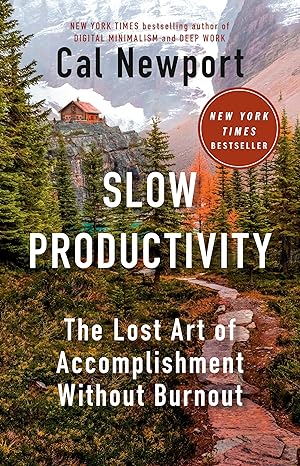Slow Productivity at Amazon.com
“Slow Productivity: The Philosophy of Doing Less and Achieving More” by Cal Newport explores a counterintuitive approach to productivity that emphasizes depth, focus, and intentionality over constant busyness and superficial output. Newport, known for his work on deep work and digital minimalism, argues for a shift from the traditional hustle culture to a more deliberate and thoughtful approach to work.
Key themes in the book include:
- The Concept of Slow Productivity: Newport introduces the idea of “slow productivity,” which advocates for working more slowly and deliberately to achieve higher quality and more meaningful results. He contrasts this approach with the fast-paced, efficiency-driven mindset prevalent in modern work environments.
- Deep Work vs. Shallow Work: Building on his previous work, Newport revisits the distinction between deep work (focused, high-value tasks) and shallow work (surface-level, often administrative tasks). He argues that embracing slow productivity involves prioritizing deep work and reducing distractions to produce more impactful outcomes.
- The Importance of Focus: Newport emphasizes the role of sustained focus in achieving high-quality work. He provides strategies for minimizing interruptions, managing attention, and creating an environment conducive to deep, uninterrupted work sessions.
- Intentional Work Practices: The book advocates for intentionality in work habits and project management. Newport encourages readers to be selective about the tasks they undertake, focusing on those that align with their long-term goals and values.
- Rejecting Busyness: Newport challenges the notion that busyness equates to productivity and success. He argues that many people equate being busy with being productive, but true productivity involves thoughtful engagement with fewer, more significant tasks.
- Long-Term Success: Newport discusses how slow productivity can lead to long-term success and fulfillment. By focusing on deep work and meaningful projects, individuals can achieve greater satisfaction and recognition in their professional lives.
- Practical Advice and Techniques: The book provides practical advice and techniques for implementing slow productivity principles. This includes methods for organizing tasks, setting boundaries, and managing time to prioritize high-value work.
Overall, “Slow Productivity” presents a philosophy that challenges conventional productivity practices, advocating for a more intentional, focused, and meaningful approach to work. Newport’s insights aim to help readers achieve greater success and satisfaction by doing less but achieving more through deliberate and deep engagement with their work.
Similar Books
“Deep Work: Rules for Focused Success in a Distracted World” by Cal Newport
Newport’s foundational book on the importance of focused, undistracted work.
“Digital Minimalism: Choosing a Focused Life in a Noisy World” by Cal Newport
Newport discusses how to declutter your digital life and focus on what truly matters.
“Essentialism: The Disciplined Pursuit of Less” by Greg McKeown
McKeown emphasizes focusing on the essential tasks and eliminating the non-essential ones.
“Atomic Habits: An Easy & Proven Way to Build Good Habits & Break Bad Ones” by James Clear
Clear provides strategies for forming productive habits and breaking unproductive ones.
“The One Thing: The Surprisingly Simple Truth Behind Extraordinary Results” by Gary Keller and Jay Papasan
Keller and Papasan focus on identifying and prioritizing the most important task.
“Make Time: How to Focus on What Matters Every Day” by Jake Knapp and John Zeratsky
Knapp and Zeratsky offer practical advice on how to prioritize meaningful activities in daily life.
“The 7 Habits of Highly Effective People: Powerful Lessons in Personal Change” by Stephen R. Covey
Covey’s classic guide on personal and professional effectiveness.
“The Power of Less: The Fine Art of Limiting Yourself to the Essential…in Business and in Life” by Leo Babauta
Babauta offers tips on simplifying your life and focusing on what’s important.
“Indistractable: How to Control Your Attention and Choose Your Life” by Nir Eyal
Eyal provides strategies for managing distractions and staying focused.
“Drive: The Surprising Truth About What Motivates Us” by Daniel H. Pink
Pink explores the science of motivation and how it can enhance productivity.
“Flow: The Psychology of Optimal Experience” by Mihaly Csikszentmihalyi
Csikszentmihalyi discusses the state of flow and how it contributes to peak performance.
“The Productivity Project: Accomplishing More by Managing Your Time, Attention, and Energy” by Chris Bailey
Bailey shares insights from his year-long experiment in productivity.
“Rest: Why You Get More Done When You Work Less” by Alex Soojung-Kim Pang
Pang explores the importance of rest and how it can enhance productivity.
“Off the Clock: Feel Less Busy While Getting More Done” by Laura Vanderkam
Vanderkam provides tips on how to manage time effectively and feel less rushed.
“The Miracle Morning: The Not-So-Obvious Secret Guaranteed to Transform Your Life (Before 8AM)” by Hal Elrod
Elrod’s guide to creating a morning routine that boosts productivity and well-being.
“Do Less: A Revolutionary Approach to Time and Energy Management for Busy Moms” by Kate Northrup
Northrup offers a new perspective on productivity, focusing on doing less to achieve more.
“Eat That Frog!: 21 Great Ways to Stop Procrastinating and Get More Done in Less Time” by Brian Tracy
Tracy presents practical strategies for overcoming procrastination and increasing productivity.
“Zen to Done: The Ultimate Simple Productivity System” by Leo Babauta
Babauta’s simplified approach to productivity, focusing on habit-building and mindfulness.
“Your Best Year Ever: A 5-Step Plan for Achieving Your Most Important Goals” by Michael Hyatt
Hyatt provides a framework for setting and achieving significant goals.
“The Art of Stillness: Adventures in Going Nowhere” by Pico Iyer
Iyer explores the benefits of slowing down and embracing stillness in a fast-paced world.
